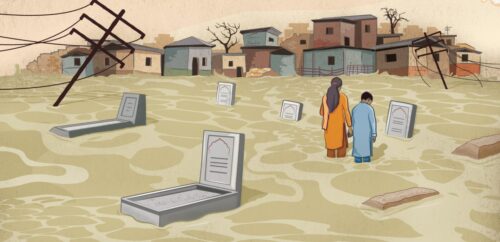Three years after devastating floods in Pakistan in 2022, the country’s disaster management authorities are not doing enough to protect lives during climate disasters: nearly 900 people have died amidst monsoon rains this year, more than half the official number in 2022.
What’s the problem?
Pakistan contributes just 1% to global greenhouse gas emissions, yet it is among the most vulnerable to climate change-related disasters.
While Pakistan may not have caused climate change, the authorities must step up and meet the climate challenges of our time. Despite findings by Amnesty International and other organizations about the gaps in disaster responses, the Disaster Management Authorities continue to fall short when it comes to protecting human life.
Early warning systems do not reach victims in time; limited funding, particularly at the local level, leaves local administration woefully unprepared; and the disaster response is fragmented, meaning that vital agencies such as health and disaster management often do not coordinate in response to things like communicable diseases after a flood.
All countries need to adapt to climate change, and Pakistan is no exception: the authorities must do more to protect the right to life and health during these emergencies. Investigative journalists have found that even the money available for disaster responses is not always spent, leaving people to suffer, and funding for disaster management rarely reaches local governments, leaving them understaffed and overwhelmed in times of emergency.
What can you do to help?
Sign this petition now, which we will send to the Senate and National Assembly Standing Committees on Climate Change, as well as to provincial assemblies and local governments, calling on them to:
- Demand a thorough and independent investigation of the disaster management authorities’ performance during the 2025 flood and heatwave season and for the results of the investigation to be made public; in particular, demand information about the gaps in early warning systems and efficiency of budgetary allocations at all levels of government – national, provincial and district
- Investigate the adequacy of post-flood responses particularly with regards to housing, healthcare and the spread of communicable diseases, education, and livelihoods.
Link to action: Website of Amnesty International

